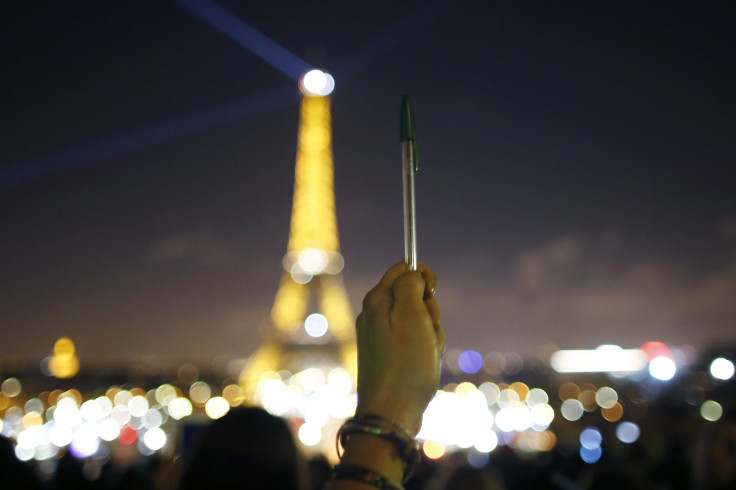Paris Study Abroad: After Charlie Hebdo, France Remains Popular Travel Destination For American Students

American college student Megan Norregaard had been studying in Paris for just three days when Islamist gunmen murdered 12 people at the editorial office of the French satirical magazine Charlie Hebdo. From afar, the picturesque French capital appeared overwhelmed with carnage and chaos. But on the ground, Norregaard said Parisian life carried on as usual.
“In America, you didn’t know what was happening,” said Norregaard, who was 30 minutes away from the Charlie Hebdo office at the time of the attack on a class trip to the Picasso Museum. “The Parisians around us weren’t worried.”
The city is known for its high fashion, gourmet restaurants, quaint streets, unique architecture and historic sites, making it one of the most popular study-abroad destinations for U.S. students. After France's deadliest terrorist attack since 1961 unfolded earlier this month, some worried that Paris' growing battle against terrorism and Islamist militants would scare off overseas visitors. But students, university officials and travel experts said in recent days that the Charlie Hebdo massacre has not tarnished the city's allure and would not impact study-abroad programs in Paris.
Norregaard, 20, a fashion merchandising undergraduate student at the University of Delaware, said students who had contact with family in the United States were afraid to leave the museum immediately after the Jan. 7 attack on Charlie Hebdo, which was targeted for publishing controversial cartoons on Islam. “Leaving the Picasso Museum was a big deal for a lot of people,” she said. “Their parents were making them more nervous.”
Security officials were deployed by the thousands in search of the two Charlie Hebdo terror suspects, Frenchmen Saïd and Chérif Kouachi, who were killed Jan. 9 in a clash with police. But Norregaard said the increased security didn’t disrupt daily life and her school program proceeded as scheduled. “Everything operated as normal. It was just scary to see people with guns on the streets,” Norregaard said. None of her fellow students have asked to return home early.
School officials said they made minor security changes after the shootings. “The [study-abroad] programs continue as normal with some minor precautions,” University of Delaware spokeswoman Andrea Boyle said. “[Our risk management and security] firm thus far does not advise against travel to Paris or evacuation from the city, but rather avoidance of affected areas.”
Other colleges also reevaluated their study-abroad programs in Paris. Jaime Marland, spokeswoman for the Rhode Island School of Design, said the college’s five-week travel course in Paris is running as scheduled and all students have remained in the French city, “though awareness is certainly heightened.”
Kent State University fashion director J.R. Campbell said no students have withdrawn from the fashion program in Paris, which will take place in July as scheduled. “We have not had any impact from the situation in Paris at this point,” Campbell said.
Ines DeRomana, director of the University of California’s system-wide international exchange program, which serves all 10 campuses, said no students have dropped out of the spring semester in Paris. “All families of the UC students received a message from our office, informing them of the actions we had taken and encouraging them to stay informed of the situation in Paris through French sources,” DeRomana said. “We stand ready to help any student.”
Barb Levison, a travel adviser for Tips on Trips and Camps, which connects families with more than 600 companies to find summer travel experiences for children, said her clients have not expressed concern over traveling to France and companies have not announced any changes in or cancellations of Paris programs. “It happens every year. There’s some issue somewhere and organizations have to decide whether or not they’re going to run programming,” she said. “I’m not sure how I would feel sending my child to Paris this summer. The year of 9/11, did I want to rush to New York? Not so much.”
Ned Clark, vice president and program director of Travel for Teens, which brings hundreds of youths on trips to Europe each year, said the company has not canceled future trips to France and parents have not asked to withdraw their children from any programs in Europe. Clark told parents in an email that the president of Travel for Teens was in Paris during the attacks and the company felt safe taking students to the region.
“Life quickly returned to normal in the sense that if one had no access to the news, one would not have known anything had happened," Clark said in the email, dated Jan. 15. "People went to work, shopkeepers smiled, cafes were full, public transport continued as before, tourists jammed Notre Dame. If anything, people demonstrated a kinder, gentler approach to each other.”
Since the attacks, Norregaard said she and a few fellow students have participated in peace rallies and moments of silence in Paris. She hoped to obtain the latest Charlie Hebdo issue, which was published by surviving staffers, and also visit the site of the tragedy before her Feb. 5 departure. “It’s sort of the same idea as going to ground zero," she said. "It’s a really significant event for Paris and it should be remembered.”
© Copyright IBTimes 2024. All rights reserved.





















